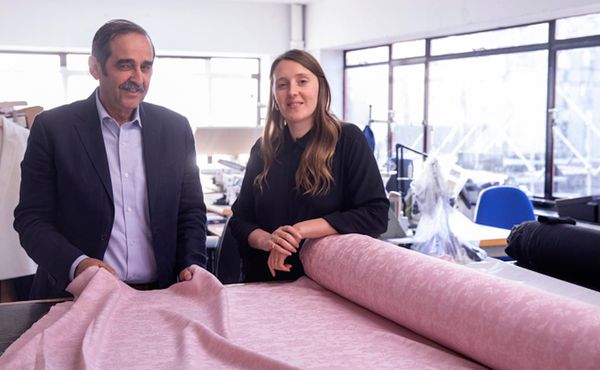 |
| Fashion Reimagined director Becky Hutner on Pedro Otegui with Amy Powney: “We met Pedro, whom we call the grandfather of Uruguayan wool, the David Attenborough of Uruguay.” |
Another highlight of the 21st edition of the Tribeca Film Festival is Becky Hutner’s documentary on Mother of Pearl fashion designer Amy Powney’s journey with brand manager Chloe Marks in search of building a sustainable collection. Along the way Becky introduces Amy to her idol Katharine Hamnett, one of the first fashion designers to raise awareness about the responsibility of those involved with clothing, which means: all of us. Andrew Morgan’s documentary The True Cost, featuring Livia Firth was an early alert on the devastating impact fast fashion is having on the environment.
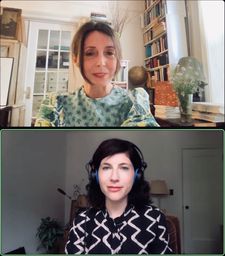 |
| Becky Hutner with Anne-Katrin Titze (in Batsheva) on connecting Katharine Hamnett with Amy Powney: “It was wonderful to get the two minds together.” |
Fashion Reimagined begins in London’s Soho in April 2017, where the Designer Fashion Fund gave Powney the prize as UK top emerging designer. Having grown up with activist parents as far from the fashion world as it gets,“two souls, alas, are housed within [her] breast,” to quote Goethe’s Faust.
Amy and Chloe’s odyssey, filmed by Daniel Götz, is an adventure tale, which includes a visit to the cutest llamas in Peru. In Uruguay, it turns out, Pedro Otegui’s family farm is the answer to their sustainability prayers. Animals in the open air, the country has a thriving wool industry, but no large-scale spinning or knitting capabilities at all. The conflicts and obstacles are many and the effort needed to overcome them is significant.
Most importantly, Fashion Reimagined makes very clear how much consumers themselves can do to make changes. From buying second-hand, to fixing what is broken, to wearing your clothes longer and buying fewer items, the responsibility is with us, same as it is with food. We all eat and get dressed every day and small changes can have great impact.
From Toronto, Becky Hutner joined me on Zoom for an in-depth conversation on Fashion Reimagined.
Anne-Katrin Titze: Becky, hi!
Becky Hutner: Hello Anne-Katrin, thank you for inviting me!
AKT: Your film has a very important subject matter that interests me a lot.
BH: Thank you.
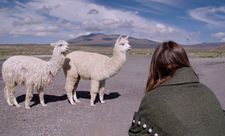 |
| Amy Powney with llamas in Fashion Reimagined |
AKT: Did you first encounter Amy Powney and Mother of Pearl or did you first have the idea that you wanted to make a film about sustainable fashion?
BH: That’s a really good question. The answer is, while I was very interested in sustainability, it was Amy and Mother of Pearl that came first. I was really passionate about sustainability for years before I met Amy in 2017. I had made lifestyle changes and wanted to do something beyond my own life. It was kind of a perfect storm when I met Amy. So it was 2017 and it was through my day job as a filmmaker working for DUCK Productions which produces short content for fashion brands.
So one of my jobs for DUCK was to film the Vogue Designer Fashion Fund, which Amy won, and do a little short around Amy. That’s how I met her and I interviewed her in her home and asked her what was next in her career and she began to tell me about this really exciting project. She was trying to create a sustainable collection, from fibre to finished garment; she wanted to meet the sheep whose wool was going to end up in her coats and walk the cotton fields and meet the cotton pickers. And the lightbulb just went off - we need to do a feature doc.
AKT: And you start out the film with that, I think, with the award in 2017. The journey makes clear how difficult it is. It sounds so wonderful, meet the sheep, then get the spinning done. Your film shows that it is actually a nightmare to accomplish.
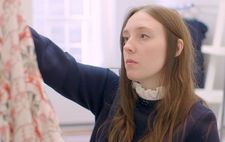 |
| Becky Hutner on Amy Powney: “I was really passionate about sustainability for years before I met Amy in 2017.” |
BH: I know! It was just so so difficult, and even as complicated as it seems in the film, it was way more complicated. There wasn’t enough time to show everything that went wrong and all the challenges. Luckily sustainability in fashion has made some progress, so it is easier for designers today to access sustainable fabric, to visit their suppliers, but it still is very tough.
AKT: Any awareness about this is good. As you quote in your film, we buy three times as many clothes as in 1980, and wear them half as long. Three out of five garments land in a landfill within a year. That is a disaster.
BH: I know, they are really shocking numbers. If I had to pinpoint the biggest issue environmentally in fashion, it’s the volume of production. It’s the amount of product we are producing every year. I think it’s 150 billion garments per year and the fact that the majority of that are ending up in landfills, not to mention the resources that go into those clothes, it’s just completely heartbreaking and obviously unsustainable.
AKT: I am sure you are familiar with The True Cost, Andrew Morgan’s film. I did features on events when it came out with Livia Firth and her Green Carpet initiative. One of the things she mentioned was that she’s trying to convince celebrities and everyone actually, to wear everything at least 30 times.
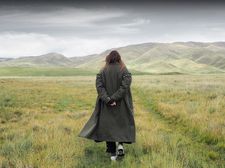 |
| Becky Hutner on Amy Powney: “She was trying to create a sustainable collection, from fiber to finished garment …” |
I was asking my students, undergraduate students in their late teens, early twenties, if they wore the items they buy 30 times. They were quite honest, shaking their heads, most of them saying absolutely not. That change in awareness is very important to push.
BH: That’s really disappointing that the answer is no. I’m not surprised. First of all, The True Cost was a huge inspiration for this film. I watched it immediately, as soon as we decided we’re going to make it. I watched The True Cost and it completely blew me away. Livia Firth has done such amazing work. It really needs to be all hands on deck with these issues.
There needs to be a cultural shift to investing in quality pieces that you want to keep for a long long time. We need to shift to a place where shoppers are buying things because they really really love them, they need them, and they want to keep them for a long time. That’s going to take a lot of education and awareness raising to get people back to that place.
AKT: Your film does a great job raising awareness and on the other hand it is this adventure story of you and Chloe [Marks] and Amy traveling around the globe to Uruguay to meet Pedro [Otegui], who is wonderful. Tell me a bit about all the travels!
BH: It was definitely a great adventure. The first place we went to was Uruguay, where, as you mentioned, we met Pedro, whom we call the grandfather of Uruguayan wool, the David Attenborough of Uruguay.
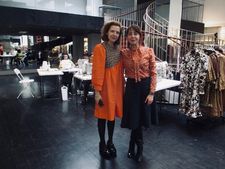 |
| Batsheva Hay with Anne-Katrin Titze and her seamstresses Photo: Anne-Katrin Titze |
AKT: That is so fitting!
BH: He’s just so wonderful and speaks in quote form. Everything he says is just a pearl of wisdom. It was a great adventure! From there we went to the Peruvian Andes to a sustainable alpaca farm. We traveled across Turkey to learn about sustainable denim production.
Having this adventure, like two girls off on a mission, hopefully that creates some excitement about the topic. Because actually the topic of supply chains can be very dry and not sexy. How do you make a story about supply chains entertaining? I think that’s one way to do it, to have really strong characters, a great narrative, and travel never hurts.
AKT: Some nice baby llamas also help!
BH: Baby llamas never hurt!
AKT: Any film that has baby llamas I watch. Some of the information, you just mentioned the denim, I did not know. 35% of the ocean’s microplastics are from washing clothing!
BH: Yeah, that’s a really shocking one and it still surprises me even though it’s been sitting with me for a while. Because the narrative around ocean plastic is plastic bottles, plastic bags. Of course we should avoid single-use plastic, but the fact that the majority of this ocean microplastic is coming from our clothes is just something that is really underreported and a message that we really need to get out there.
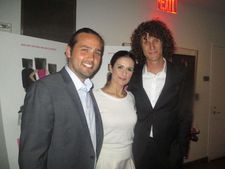 |
| Executive producer of The True Cost Livia Firth with producer Michael Ross and director Andrew Morgan |
AKT: The extent to which our clothes are a culprit is really not known enough. The pledges mentioned in the film, can you talk some more about that? They started in February 2020?
BH: Yes, what’s so exciting about that campaign is that at first the mission was about producing sustainable clothes, this one sustainable collection. But along the journey, Amy realized that with everything she learned she had an imperative to share this information with a larger audience. Mother of Pearl garments are luxury garments, they are not at an accessible price point to most people. They are not at an accessible price point to me.
AKT: I do get their emails.
BH: Fashion Our Future, which is the name of their campaign, was a way for Amy to present sustainable fashion in a much more expansive and accessible way. We have many pathways to amazing sustainable clothing that don’t involve buying a new expensive garment. One of the pledges includes buying second-hand over new, which is a win win win win because it’s cheaper, they are unique pieces, you’re supporting local business, and it’s better for the planet because you’re keeping resources in circulation and out of landfills. So that’s a great one.
Another one is the fixer. We all have those items in our closet that are missing a button, the hem is down, maybe the shoe is scuffed. So instead of buying new, that pledge asks you to either fix it yourself or support your local seamstress and bring that work to them. So fix your garments. There’s many others, like rent instead of buying new for special occasions. That campaign was all about making sustainability in fashion more inclusive and more expansive. There’s so many ways that we can enjoy fashion sustainably.
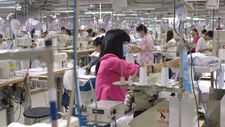 |
| Becky Hutner on The True Cost: “I watched The True Cost and it completely blew me away.” |
AKT: There is a moment in your film when all the changes in the industry come up. It was when Alber Elbaz was stepping down from Lanvin and Raf Simons no longer at Dior and Marc Jacobs leaving Louis Vuitton - in other words the rat race that is so much a part of it. The designers feeling the feeding frenzy. We are a little bit better with that carousel of more and more collections at the moment, don’t you think? The pandemic helped to slow things down a little.
BH: Yes and no. For sure, sustainability for the designers themselves is a part of it. When they’re asked to produce eight, 12 collections a year, how can they possibly be mindful about what they are doing, let alone source things sustainably, let alone sleep. You know, maintain their health, their sanity. That’s a big piece of Amy - sustainability in her office and amongst her team.
Yes, I would like to think that on one side of the fashion industry there have been improvements, but on the other there have been some major fast fashion companies that have risen up during the pandemic quite unexpectedly. I won’t name any names but there was a big hope that the pandemic was this moment for us to slow down and maybe for the sustainability principles to rise up in the fashion industry. It’s kind of like the paths have diverted. There’s more sustainable fashion brands but there’s also some big new fast fashion brands.
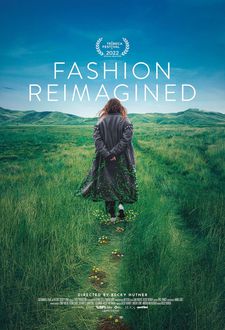 |
| Fashion Reimagined poster |
AKT: What are you wearing today? This looks like a beautiful blouse.
BH: I was wondering if you’d ask me that. Something I just threw on without a thought, but actually it is probably ten years old. It was made by artisans in Ghana. It’s cotton, not organic cotton. I have to say my awareness about organic cotton was not there ten years ago. But I always liked to support independent brands. It’s something I picked up in a little shop in L.A. where I was living at the time.
AKT: It looks great. I love the stories behind clothing. Unless they just picked it up from some chain, people are often happy to talk about why they’re wearing what they’re wearing. I also dressed up for you!
BH: I absolutely love what you’re wearing! I’m not sure if it’s a blouse or a dress.
AKT: It’s a dress. A Batsheva dress. I’ll show you!
BH: It’s so cute.
AKT: This is vintage Hawaiian cotton fabric from the Forties or Fifties.
BH: Wow!
AKT: I even know where it was made. Batsheva Hay had this pop up on West Broadway during fashion week a few years ago and she had seamstresses on site and they were making the clothing there while I talked with her.
BH: Amazing. I love that and I love the buttons! Isn’t it so much more fun to talk about your clothes when there is a story? You know where it was made or you’ve met the designer. It’s a win win, isn’t it?
AKT: The more people become aware that they don’t have to wear something new every time they show themselves on social media or wherever, the better. The mindset will hopefully shift and your film is helping with that.
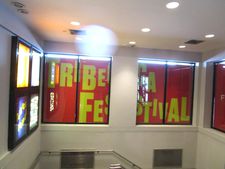 |
| Fashion Reimagined screens at Village East by Angelika on Friday, June 17 Photo: Anne-Katrin Titze |
BH: Thank you so much.
AKT: One last point about Katharine Hamnett. I was very happy to see her in your film.
BH: Katharine Hamnett has been a hero of Amy’s since her university days. The film was an opportunity to finally get them together. When Amy graduated there were very few options of getting a job in this space in around 2005. I dropped Katharine’s team an email, told her about the project and what Amy was doing. It was wonderful to get the two minds together, the veteran sustainable fashion designer and the new sustainable fashion designer.
AKT: Thank you!
BH: Thank you so much for having me, Anne-Katrin!
The remaining screening of Fashion Reimagined is on Friday, June 17 at 6:30pm - Village East by Angelika: Theater 7.
The Tribeca Film Festival runs through June 19.





















